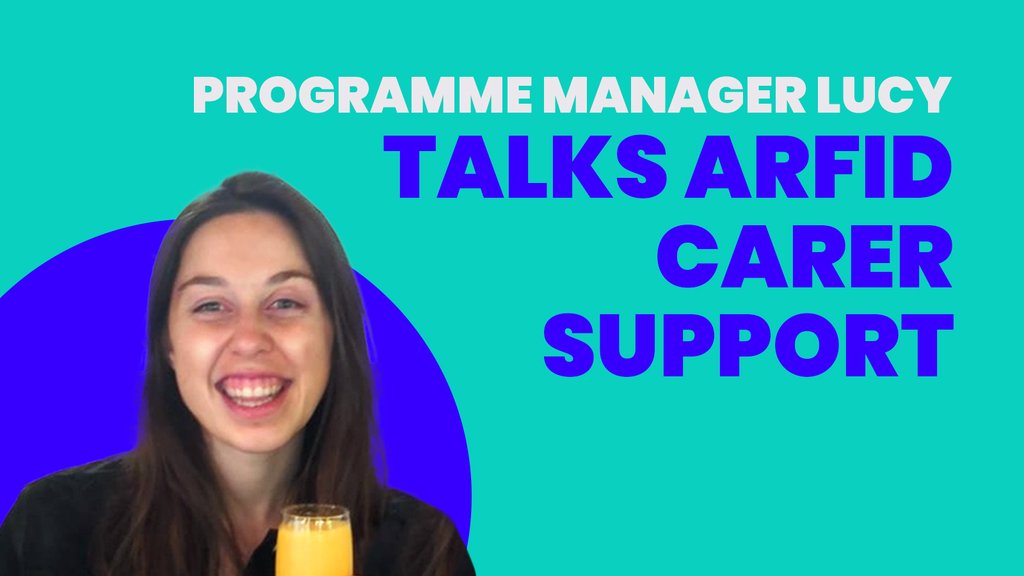
Supporting someone with ARFID? Let Programme Manager Lucy tell you about our support service, Endeavour.
I’m Lucy, and I work here at Beat. I enjoy swimming, singing karaoke (badly!) and spending time with my twin sister Sophie. And I’ve always felt driven to support people affected by eating disorders.
I’m especially passionate about ARFID (Avoidant/Restrictive Food Intake Disorder), which is often misunderstood and underfunded.
So I jumped at the chance to join Beat’s support team. Now I manage Endeavour – a free online support group for parents and anyone else caring for a young person (aged 5 – 15) with ARFID. Every day, I get to help create a safe, welcoming space for carers to talk openly about their situation. Somewhere they can connect with other carers, and get advice and guidance on supporting their young person.
So, how do my team and I support carers through Endeavour?
We start by getting to know you better. Before the programme, one of us calls everyone taking part to chat individually about their needs, so we can give the best support. We explain what to expect from our support groups and help you get to grips with our guidelines – we want you to be comfortable and know you’re coming into a safe space.
Whichever member of our team you speak to is then with you for the whole programme. They send you pre-reading, guide group sessions (one a week for 90 minutes, with eight sessions in total), and answer any questions.
In the first session, we start with introductions – we want you to be able to build a really valuable network of people in the same situation as you. We talk about common symptoms that appear in ARFID, and we really encourage you to reflect on how ARFID is affecting your loved one, what’s worked and what hasn’t while you’ve been supporting them.
Our sessions are really varied.
We talk about everything from goal setting to managing anxiety at mealtimes, look at how to increase trust between you and your loved one, and discuss self-care and communication models that will help you support them.
We want to arm you with the skills you need to support your loved one.
We help you understand fear foods, treatment options, and your own emotional response to what your loved one is going through. as well as that all-important support network.
When we reach our final session, we all look forward together. We reflect on the positive things you’ve learned, the progress you’ve made, and goals for your and your loved one’s future.
And the best part is that it works.
I’m so proud every day to know that my team and I are supporting carers who often feel very isolated. Often when we first contact carers to introduce Endeavour, they’re relieved and grateful that there is finally some support available. Knowing we’re filling this gap and supporting families in need fills me with daily joy and enthusiasm to keep developing our programme.
I get to watch carers go from feeling alone with supporting their loved one to feeling validated and confident. I get to see them take comfort in being able to share their experiences with other carers and finding solutions together. Carers have even shared that their relationship with their child has improved, as they’ve come to better understand their child’s needs and how to communicate with them.
During the programme, we celebrate all carers’ achievements and goals, however small they may seem, because we know that all those small successes lead to big successes! It’s wonderful to hear about a child trying a new food group, or a carer taking some time for well-deserved self-care – and we commemorate these together.
All we really need from you is an open and reflective mind.
The best advice I can give anyone thinking about joining Endeavour is to come in with a willingness to be open and honest about what you’re going through. It does mean plenty of self-reflection – how do your emotions affect your loved one? What’s your communication style, and are there ways you could bring about positive change? Those can be tough questions to tackle. But we’re a safe, welcoming, judgement-free space, and carers tell us they get the most of out the sessions when they share openly.
We’re also not going to leave you to grapple with those questions by yourself. The pre-reading we send you gives you prompts to help you gather your thoughts, so you can bring them to the session and talk them out with the group. And the whole way through, we encourage you to prioritise self-care, and share what you’re learning with others caring for your loved one.
Want to learn more?
It’s been so rewarding to help create and deliver Endeavour, and I want to see as many people get help through it as possible. You can self-refer (and remember, it won’t cost you a penny). Find out more about Endeavour.